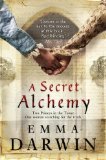The Secret Alchemy is set in both present day and 15th century England. The interwoven stories are seen through the eyes of both Elizabeth Woodville, the beautiful widow of King Edward IV, and her brother Anthony; whilst the modern section is told by historian, Una, who is writing a book on Anthony Woodville’s library. Elizabeth Woodville is the mother of the famous ‘Princes in the Tower’, who were imprisoned in the Tower by their uncle, Richard, Duke of Gloucester, after Edaward’s death.
I was impressed by the way each section came across differently, with all three characters having a recognisable voice, although I’m not sure how accurate the language of the historical section was. I’m not an expert, but it just reads differently from other books written about this period.
I didn’t think that the modern day section was really necessary. I felt the book could have benefited from concentrating on Elizabeth’s story, as I really enjoyed reading about her. Una’s character just seemed to be there to explain the history of the War of the Roses, which although I found useful, should have been able to be achieved within the historical section. I think that anyone who knows much about this period of history would feel patronised by the continual explanations of events, but luckily for me, my only knowledge of this period comes from reading Jean Plaidy books, and that was a while ago now! Towards the end the number of characters got a bit confusing for me, so I had to keep referring to the family tree provided in the front of the book, so I’m really pleased that was included.
This book is light and easy to read, but lacks the atmosphere of a great piece of historical fiction. I can see why this book would appeal to many people, but I felt that it meandered around a bit too much and so failed to really engage me.
![]()
Emma Darwin’s first book The Mathematics of Love was short listed for the Commonwealth Writer’s Prize (Best First Book, Europe and South Asia) in 2007. It seems to have much more favourable reviews than this one. Has anyone read it?

